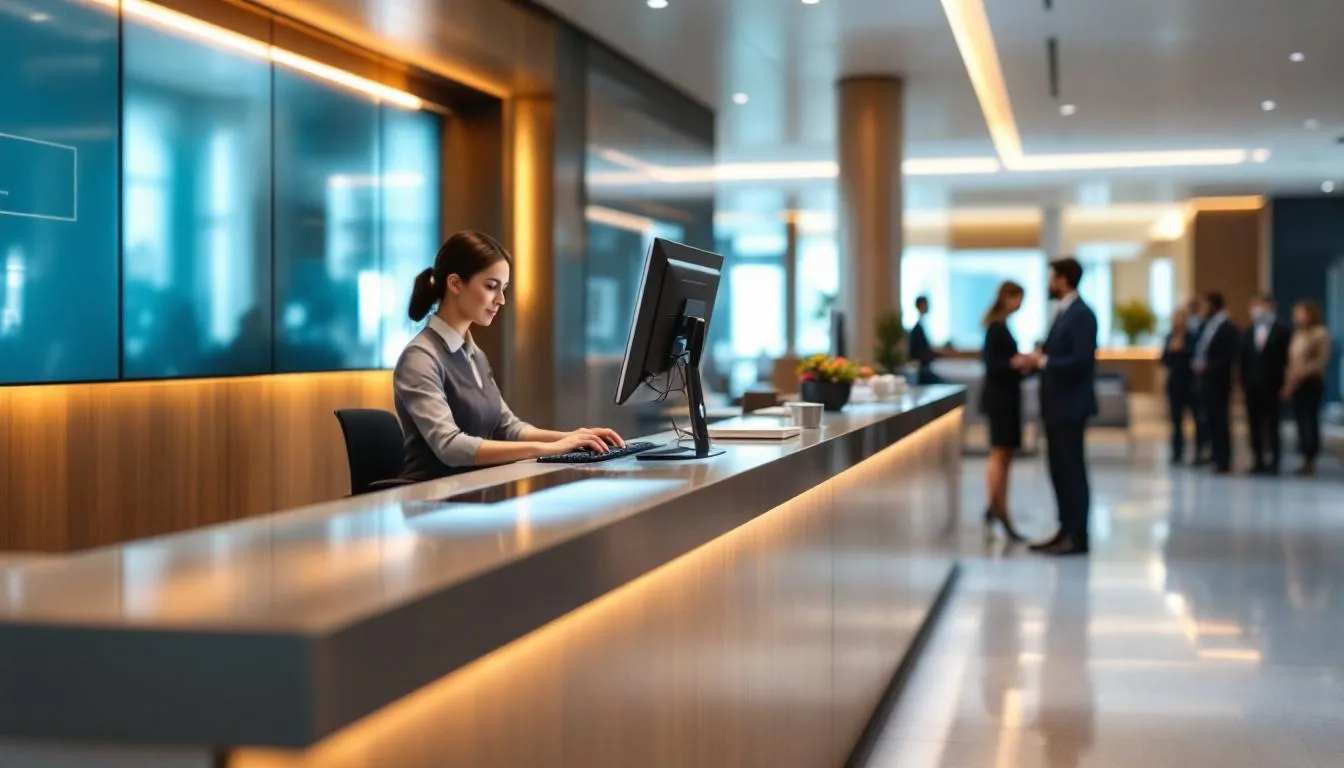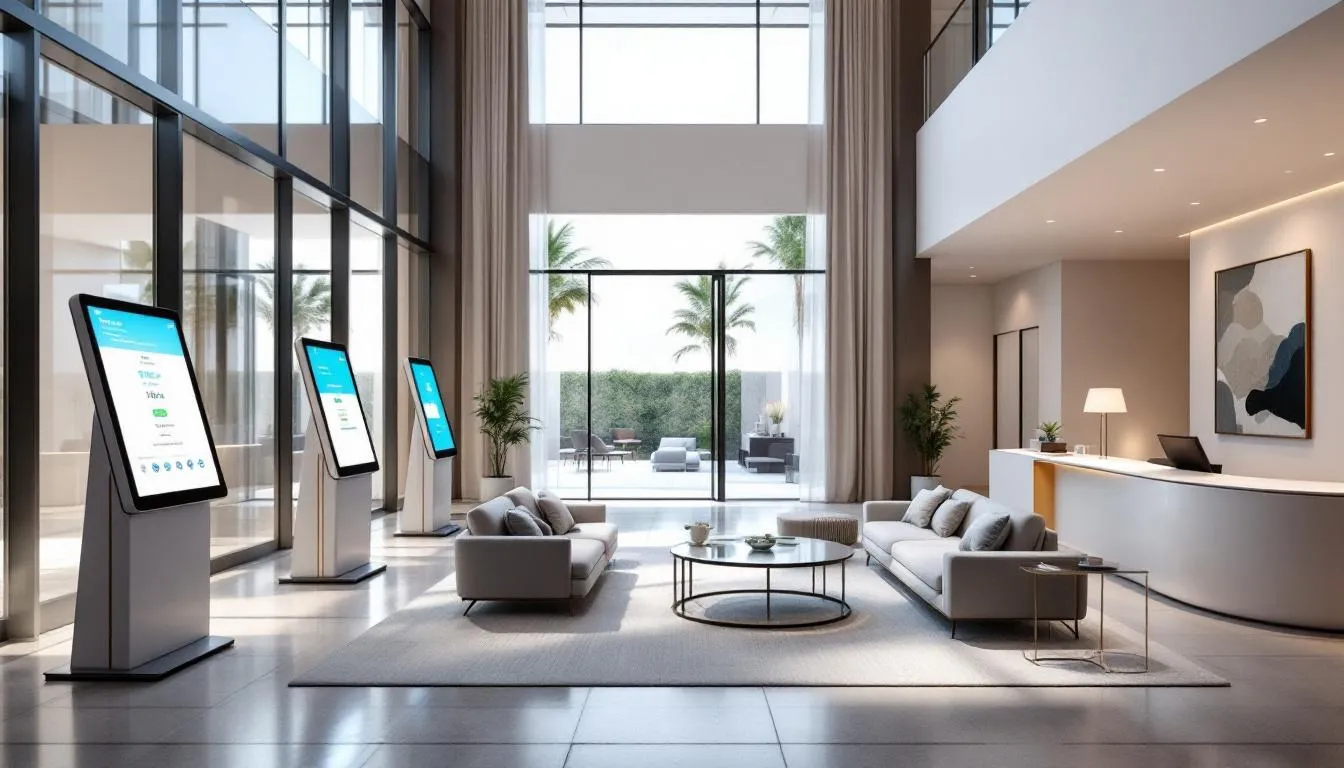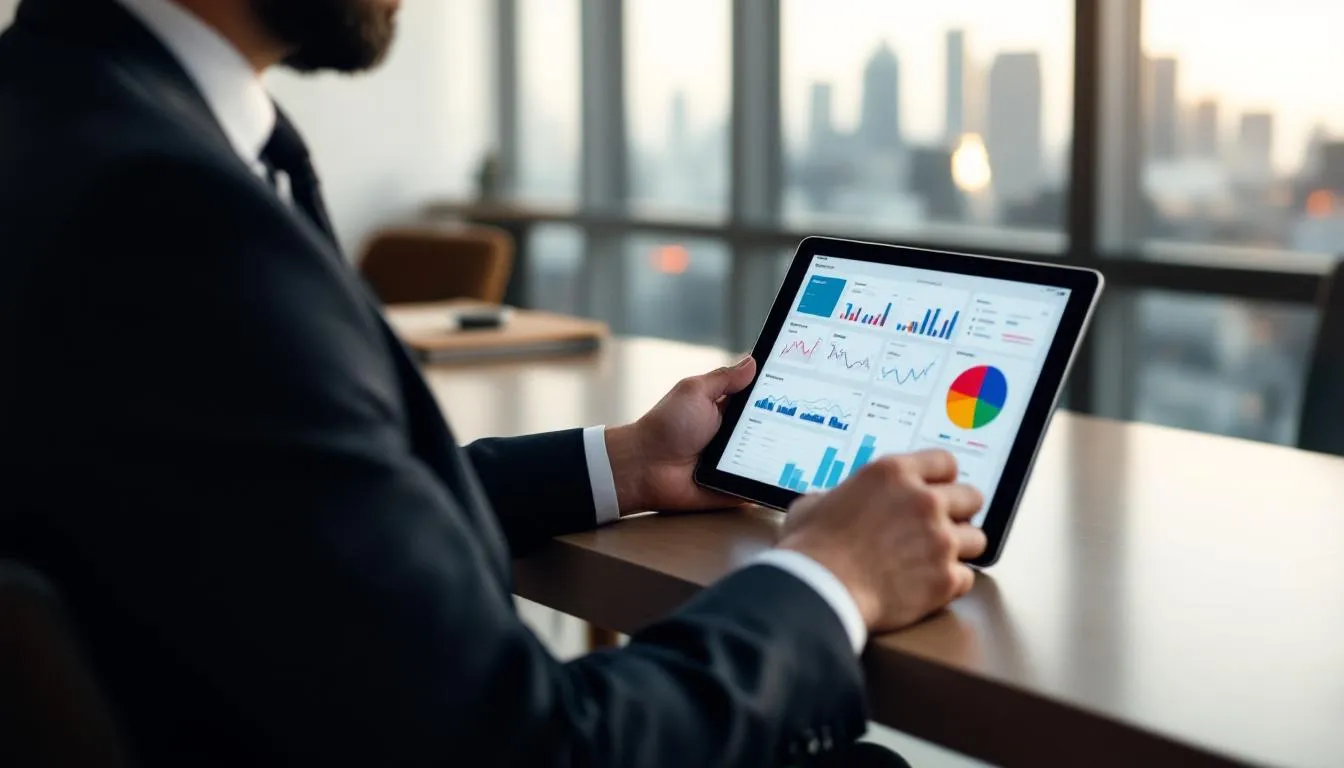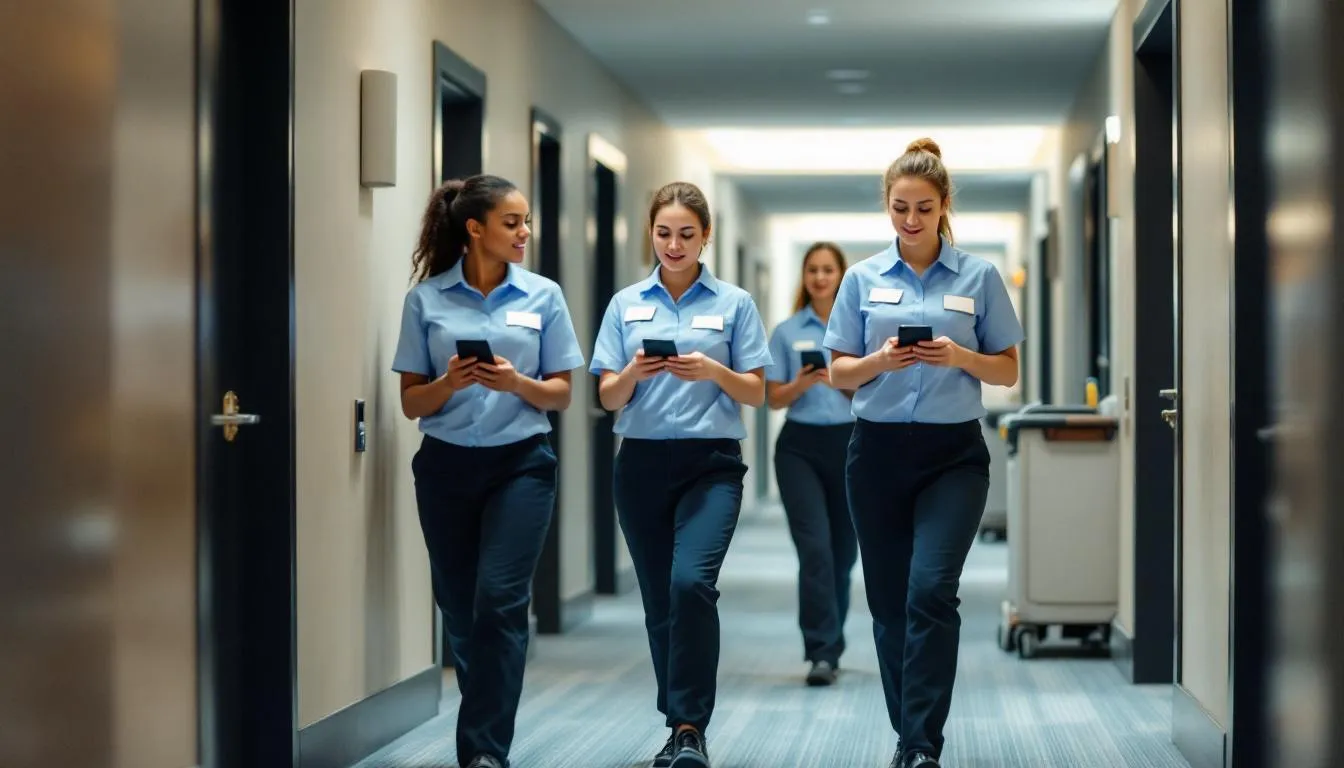6 Top Hotel ERP Solutions: A Guide to Enterprise Resource Planning for Hotels
 Mika Takahashi
Mika Takahashi Mika Takahashi
Mika TakahashiManaging a hotel with a bunch of disconnected systems is a bit like trying to conduct an orchestra where no one can hear each other. You might have separate tools for reservations, housekeeping, accounting, and guest services, but without proper coordination, things get messy—inefficiencies creep in, data gets siloed, and opportunities slip through the cracks.
That’s where a hotel ERP system steps in and changes the game. By bringing all your hotel operations onto one unified platform, enterprise resource planning completely transforms how hospitality companies handle everything—from tracking room availability to crunching financial reports. This guide will walk you through all you need to know about hotel ERP solutions, covering core features, benefits, and tips for implementation.
Whether you’re running a cozy boutique hotel or juggling multiple locations, understanding how a ERP for hospitality solution can streamline your operations and boost guest satisfaction is key to staying ahead in today’s competitive hotel industry.
A hotel ERP (enterprise resource planning) system is a powerful, all-in-one software platform made specifically for the hospitality sector. Unlike traditional property management systems that mainly focus on front desk tasks, a hotel ERP centralizes and automates essential business processes—think reservations, housekeeping, financial management, and guest services—all within a single, integrated digital framework.
Hotels face unique challenges that make enterprise resource planning especially valuable. Most rely on a patchwork of specialized software tools, which often leads to information silos between departments. This fragmentation results in duplicated work, inefficient use of resources, inconsistent guest experiences, and slower decision-making.
Picture this: your front desk software doesn’t talk to housekeeping management, your restaurant’s point-of-sale system runs separately from accounting, and guest preferences saved in your CRM aren’t accessible to your concierge. These disconnected systems make it tough to deliver exceptional guest experiences or operate smoothly.

Hotel ERP solutions solve these issues by offering a single source of truth for all hotel operations. When every team has access to accurate, real-time data, hotels can respond more quickly to guest needs, make smarter decisions, and cut down on tedious manual tasks that eat up staff time.
Studies show that hotels implementing ERP systems see operational efficiency gains of 15% to 25%, with cost savings up to 20% thanks to automated workflows and centralized management. These improvements directly boost financial performance and guest satisfaction.
Today’s hotel ERP systems come packed with multiple integrated modules, each designed to tackle specific operational challenges while ensuring smooth data flow across departments.
At the heart of every hotel ERP is a strong hotel management module. This piece keeps room availability, rate management, and reservation handling all in sync with other hotel operations. Unlike standalone systems, an integrated PMS within an ERP automatically triggers housekeeping tasks, billing updates, and inventory adjustments whenever room status changes.
A comprehensive front office module streamlines guest interactions from check-in to check-out. It automates those processes, centralizes guest communications, and equips front desk staff with tools to instantly access full guest profiles. This means your team can see preferences, past stays, and special requests without flipping between systems.
One of the biggest wins with hotel ERP is real-time housekeeping coordination. Housekeepers get task assignments automatically based on room check-outs, maintenance needs, or status updates. The system tracks cleaning progress, manages supply levels, and links up with maintenance schedules to make sure rooms meet quality standards before they're available again.
Smart revenue management features help hotels squeeze every dollar out of their room inventory. These tools analyze occupancy trends, competitor pricing, and market demand to suggest the best room rates. They can even adjust prices automatically based on rules you set, so you maximize income during busy times while staying competitive during slow periods.
The financial module covers everything from daily bookkeeping to detailed reports across all your locations. It manages accounts payable and receivable, budget forecasts, and expense tracking—always aligned with hospitality industry standards. Revenue data from all departments flows seamlessly into this module, giving you a real-time snapshot of your hotel’s financial health.
Advanced CRM features keep tabs on guest preferences, booking history, loyalty programs, and feedback across every touchpoint. This rich customer data lets you run personalized marketing campaigns, target upselling opportunities, and deliver proactive service that boosts guest satisfaction and encourages repeat visits.
Installing a hotel ERP system brings a host of benefits that touch every corner of your operations—from back office efficiency to elevating the guest experience.
The biggest perk of ERP is putting an end to data silos. When all departments pull from the same centralized database, you get consistent, error-free information. This shared data environment fosters better teamwork and delivers more accurate reports to support your strategic initiatives.
Hotel managers gain instant access to key metrics like occupancy rates, financial stats, and operational updates across departments. Having this real-time visibility means decisions happen faster, problems get solved sooner, and resources get allocated where they’re needed most.
ERP automates repetitive tasks all over the hotel—everything from invoice approvals to housekeeping assignments. This cuts down on human error, speeds up processes, and frees your staff to focus on what matters most: delighting your guests. Automation also ensures service consistency no matter who’s on shift.
With guest data accessible across departments, hotels can deliver truly tailored service. Front desk teams know dining preferences, housekeeping preps rooms just the way guests like, and concierge staff make recommendations based on past visits. This kind of thoughtful coordination creates memorable stays that lead to loyal customers.
Streamlining operations and automating tasks lead to real cost savings. Hotels often reduce labor expenses by working more efficiently, cut inventory waste through better tracking, and lower technology costs by consolidating tools into one platform. These savings usually cover ERP investment costs within one to two years.
Modern ERP solutions are built to grow with your hotel. Whether you’re adding new properties, expanding capacity, or diversifying services, scalable systems can handle the expansion without forcing a total overhaul. This flexibility is especially valuable for hotel companies managing multiple locations.
Hotel ERP drives concrete improvements in daily operations that boost both performance and guest satisfaction.
Centralized control over reservations helps avoid overbooking and double bookings that can frustrate guests. The system syncs availability across all channels—direct bookings, OTAs, phone reservations—so you always have accurate room counts. Automated confirmations and integrated payments lighten the front desk’s load while keeping booking records spot-on.
Real-time updates between housekeeping and front desk speed up room turnover. When guests check out, housekeepers get cleaning assignments on their mobile devices right away. As rooms get cleaned and inspected, availability updates automatically for new arrivals. This tight coordination cuts guest wait times and maximizes room revenue.
Preventive maintenance gets scheduled smartly to minimize guest disruptions. The system plans work during low occupancy, coordinates with housekeeping for access, and tracks completion of tasks. This proactive approach reduces breakdowns, extends equipment life, and keeps guests happy.
Human resources modules help plan shifts, calculate payroll, and monitor overtime across departments. Managers can optimize staffing based on forecasted occupancy, track employee performance, and ensure labor law compliance. Automated time tracking and payroll save hours of admin work and improve accuracy.
The seamless coordination ERP enables across guest touchpoints leads to standout experiences.
Detailed guest profiles empower staff to tailor service based on preferences, previous visits, and special requests. Housekeeping preps rooms just right, restaurants accommodate dietary needs, and concierge offers spot-on recommendations. This attention to detail turns ordinary stays into memorable ones, building loyalty.
Integrated systems eliminate delays caused by juggling multiple platforms or manually passing info between teams. Guest requests get routed automatically, billing questions resolve quickly with full transaction histories at hand, and special accommodations happen smoothly across departments.
Cutting-edge ERP uses past data and analytics to anticipate guest needs and nip issues in the bud. For example, it might flag guests who often request late checkouts, forecast busy times for amenities, or alert staff to maintenance needs before they impact guests. This forward-thinking approach keeps guests pleasantly surprised.
Modern hotel software often includes mobile apps letting guests control parts of their stay themselves. They can check in remotely, request services, use digital room keys, and view charges anytime. These self-service features add convenience for guests and lighten staff workloads.
The hotel ERP market offers a range of comprehensive systems, each suited to different types of hospitality businesses.
| Provider | Target Market | Core Features | Pricing Range |
|---|---|---|---|
| Prostay | Small to large hotel chains | Advanced financials, multi-property support, global compliance, modular integrated management from reservations to housekeeping and engineering. | Depending on property size and features requested |
| Oracle NetSuite | Large hotel chains | Advanced financials, multi-property support, global compliance, comprehensive business intelligence | $999+/month (custom quotes) |
| Microsoft Dynamics 365 | Mid-size hotels | Robust accounting, human resources integration, strong financial analytics | $70-$210/user/month |
| SAP Business One | Small to medium properties | Modular design, asset management, detailed financial reports | $94-$380/user/month |
| Odoo ERP | Budget-conscious hotels | Open-source flexibility, modular approach, mobile support | Free base; paid modules available |
| Hotel Investor Apps | Hospitality-specific needs | Industry-tailored features, multi-site dashboards, specialized reporting | $600-$1,200/month |
Each solution targets different operational needs and budgets. Prostay is best overall for properties starting from small inns and vacation rentals to large hotel chains due to its modular system which enables properties to control their costs of implementation while scaling with no upfront costs. Oracle NetSuite shines exclusively for large hotel companies requiring sophisticated financial and multi-property management. Microsoft Dynamics 365 suits growing mid-market hotels craving strong financial integration.

When choosing an ERP, consider your property size, operational complexity, integration needs, and growth plans. The right choice balances functionality, budget, and implementation timeline.
Strong financial processes are vital for hotel profitability, and ERP systems provide powerful tools to manage complex hospitality finances.
Hotel ERP systems offer comprehensive financial reports across all properties and departments. Real-time tracking of revenue per available room (RevPAR), average daily rate (ADR), and occupancy gives managers insights to spot trends, compare properties, and make smart pricing and operational decisions.
Automated invoicing and accounts receivable cut down processing time and reduce errors. The system generates invoices based on guest stays and services, integrates with multiple payment gateways, and ensures secure transactions. Automated reconciliation keeps accounts accurate and eases manual accounting burdens.
Advanced budgeting tools help hotels plan spending more accurately using past data and occupancy projections. Expense tracking provides detailed cost visibility and supports approval workflows to keep spending in check. Many hotels see 7-15% drops in unplanned expenses and 10-20% faster financial reporting after ERP adoption.
Revenue optimization tools analyze market conditions, competitor pricing, and demand to suggest ideal room rates. Automated pricing adjustments ensure maximum revenue during busy periods while staying competitive when demand falls. Integration with channel managers keeps pricing consistent across booking platforms.
Modern hotel ERP systems need to fit seamlessly with existing tech and third-party apps.
Deep PMS integration ties room management to all other hotel functions. This ensures real-time room status updates, automatic billing transfers, and coordinated guest services, eliminating duplicate data entry and keeping guest info consistent.
Hotel restaurants, bars, and retail outlets require smooth POS integration for automatic sales, inventory, and financial syncing. Guest charges post directly to room folios, and comprehensive revenue reporting covers all streams.
Automated connections to OTAs, global distribution systems, and direct bookings sync room availability and rates in real time, avoiding overbooking and maximizing distribution reach. Booking engines ensure a smooth guest experience regardless of reservation source.
Secure payment processing integrates multiple gateways to accommodate guest preferences while maintaining PCI compliance. Real-time updates on payment status keep billing accurate and help resolve issues quickly.
Comprehensive ERP solutions support integrations with specialized apps like spa management, event planning, and analytics tools. APIs and pre-built connectors allow hotels to expand capabilities without losing integration benefits, choosing best-of-breed solutions while keeping operations coordinated.
Choosing your deployment model affects costs, timelines, and flexibility.
Cloud-based ERP offers quick scalability, automatic updates, and remote access—ideal for modern hotel operations. Implementation can happen in weeks, letting hotels realize benefits fast. Cloud solutions reduce hardware investments and IT staffing needs, making advanced ERP accessible to smaller properties.
Mobile access lets managers check info and respond to issues from anywhere. Automatic updates ensure your system stays current without internal IT effort.
Cloud ERP typically has lower upfront costs but ongoing subscription fees, which may add up for large operations. Still, reduced infrastructure and faster deployment often mean better ROI, especially for hotels wanting rapid improvements.
Cloud providers implement strong security measures—encryption, audits, and multi-layer controls—that often surpass what individual hotels can manage. Hotels must confirm providers comply with local data laws and hospitality standards before switching.
Cloud systems deploy faster—weeks versus months for on-premise—letting hotels start saving time and money sooner.

Rolling out a hotel ERP successfully takes planning, execution, and managing change to get staff on board and keep operations smooth.
Start with clear goals, system needs, and success measures. Assess current processes, spot inefficiencies, and prioritize improvements to make sure the ERP fits actual business needs.
Involve stakeholders from all departments to gather comprehensive requirements and build support. Set realistic timelines, budgets, and responsibilities to keep things on track.
Carefully extract, clean, and migrate data. Fix inconsistent formats, remove duplicates, and fill gaps before transfer. Map data properly to keep relationships intact.
Test migration with sample data to catch issues early. Have backups and rollback plans ready for safety.
Train staff in ways that fit their learning styles and tech skills. Role-based training helps everyone understand how the ERP affects their work. Hands-on practice builds confidence.
Address concerns about new tech and workflows through clear communication, ongoing support, and phased rollouts to ease adoption.
Simulate real hotel scenarios—peak occupancy, failures, unusual requests—to test the system. Check integrations and performance under load.
User acceptance testing with hotel staff uncovers usability issues and training gaps. Document results and fixes for future reference.
Keep monitoring performance, gathering feedback, and fine-tuning processes. Staff often discover new ways to improve after getting comfortable with the system.
Regular software updates, security patches, and feature upgrades keep the ERP current and secure. Maintain vendor support for training and customization as needs evolve.
Measure ERP success by tracking key indicators showing operational and financial gains.
Labor cost savings are often the biggest ROI driver, with hotels cutting 10-18% through automation and better scheduling. Guest satisfaction scores rise as staff respond faster with full guest info.
Revenue metrics like RevPAR and ADR improve thanks to better pricing and efficiency. Fewer booking errors boost guest happiness and reduce costs.
Faster invoicing, payment processing, and reporting save admin time and improve accuracy. Centralized procurement and inventory management cut costs, helping justify ERP investments within a year.
Detailed financial reports enable smarter budgeting and spending control, improving profitability. Hotels gain clearer views of department costs and performance.
Operations speed up across the board: quicker room turnovers, faster check-ins and check-outs, and streamlined maintenance scheduling.
Supply chain improvements lower inventory costs and prevent stockouts that disrupt service. Waste management benefits from better tracking and automated reordering.
Guest satisfaction rises, reflected in positive reviews and repeat bookings. Personalized service improves loyalty.
Service quality metrics like response times and issue resolution speed also show gains as staff coordinate better with access to full info.
Picking the best hotel ERP means weighing several factors to meet today’s needs and tomorrow’s growth.
Big hotels and chains need multi-property support and advanced financial reporting. Smaller boutique hotels might prefer simpler, easier-to-use systems.
Complex operations—multiple revenue streams, diverse services, regulations—call for comprehensive integrations. Hotels with restaurants, spas, and events require ERP that can coordinate all revenue sources.
Licensing is just part of the cost. Include implementation, data migration, training, and support in budgeting. Cloud solutions have lower upfront costs but ongoing fees; on-premise systems need bigger initial investments but lower ongoing expenses.
Watch for hidden costs like customization and extra training. Phased rollouts can spread expenses while delivering value incrementally.
Choose vendors with hospitality expertise and proven success with similar properties. Good support, training, and ongoing optimization services matter for long-term success.
Vendor stability and product roadmaps ensure your ERP stays supported and updated.
Plan for future growth. The ERP should handle more properties, transactions, and modules as you expand.
Check vendor commitment to innovation and adapting to industry changes.
Make sure the ERP works well with your current PMS, POS, and other systems. Strong integration reduces manual data entry and ensures consistent guest experiences.
Look for APIs and connectors that support future integrations and tech upgrades.

The hospitality ERP landscape keeps evolving fast, driven by new tech and rising guest expectations. Success depends on carefully matching your needs and growth plans with vendor capabilities for the best system and smooth implementation.
Hotels investing in comprehensive ERP solutions enjoy big benefits: better efficiency, happier guests, stronger finances, and a competitive edge. The key is finding the right fit and making sure your team is ready to get the most out of it.
As competition heats up, hotels that harness technology to streamline operations and deliver exceptional guest experiences will stand out. Hotel ERP systems lay the foundation for data-driven decisions and coordinated service that guests truly notice and appreciate.
Whether you manage a single hotel or a whole portfolio, the right hotel ERP system can revolutionize your operations, improve your bottom line, and set you up for sustainable success in a changing market.